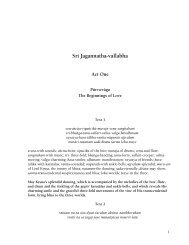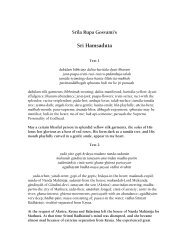Srimad Bhagavatam, Volume 3
Srimad Bhagavatam, Volume 3
Srimad Bhagavatam, Volume 3
Create successful ePaper yourself
Turn your PDF publications into a flip-book with our unique Google optimized e-Paper software.
<strong>Srimad</strong> Bhagawatam, First Canto, <strong>Volume</strong> Three<br />
Such paramhansas are naturally qualified with all the good attributes such as<br />
pridelessness, non vanity, nonviolence, tolerance, simplicity, respectability,<br />
worship devotion, sincerity and all those godly qualities exist in the devotee<br />
of the Lord spontaneously. Such Paramhansas who are completely given up to<br />
the service of the Lord are very rare. They are very rare even amongst<br />
liberated souls. Real nonviolence means not to be envious. In this world every<br />
one is envious of his fellow being. But a perfect Paramhansa being completely<br />
given up to service of the Lord is perfectly non-envious. He loves every living<br />
being in relation with the Supreme Lord and real renunciation means to have<br />
perfeet dependence in God. Every living being is dependant on somebody<br />
else, because, he is so made. Actually one is dependant on the mercy of the<br />
Supreme Lord but when one forgets his relation with the Lord he becomes<br />
dependant on the conditions of material nature. Renunciation means to<br />
renounce one's dependence on the conditions of material nature and thus be<br />
completely dependant on the mercy of the Lord. Real independence means to<br />
have complete faith in the mercy of the Lord without being dependant on the<br />
conditions of matter. This Paramhansa stage is the highest perfectional stage<br />
in the matter of Bhaktiyoga or the process of devotional service of the<br />
Suprcme Lord.<br />
Aham hi pristo aryamanah bhavadbhir<br />
Achaksha atma abagama atra yavan<br />
Nabhah utpatanti atmasamam patatrin<br />
Samam vishnugatim bipaschitah.<br />
Aham—my humbleself, Hi—certainly, Pristah—asked by you, Aryamanah—<br />
as powerful as the sun, Bhavadbhir—by you, Achakska—may describe,<br />
Atmabagama—as far as my knowledge is concerned Atra—herein, Yavan—<br />
so far, Nabhah—sky, Utpatanti—fly on, Atmasamam—as far as it can,<br />
Patatrin—the birds, Samam—simillarly, Vishnugatim—knowledge of Vishnu,<br />
Vipaschitah—even though learned.<br />
Oh the rishis who are as powerful of purity as the Sun, I shall try to<br />
describe before you all about the transcendental pastimes of Vishnu as<br />
far as my knowedge is concerned. As the birds do fly over the sky as far<br />
its capacity so also learned devotees also do describe about the Lord as<br />
far as their realisation.<br />
The supreme absolute truth is unlimited. No living being can know about the<br />
Unlimited by one's limited capacity. The Lord is both impersonal and<br />
personal also as well as localised. By His impersonal feature He is all<br />
pervading Brahman, by His localised feature He is present in every one's heart<br />
as the Supreme Soul and by His ultimate Personal feature He is the object of<br />
transcendental loving service by His fortunate associates the pure devotees.<br />
As the birds can fly in the sky in part only similarly the pastimes of the Lord<br />
in different features can only be estimated partly by the great learned<br />
devotees. So Srila Suta Goswatni has rightly taken his position in the matter<br />
of describing the pastimes of the Lord as far as he had had realised. Factually<br />
the Lord only Himself can descri be about Himself and His learned devotee<br />
also can describe about Him as far as the Lord gives him the power of<br />
description.<br />
Ekada dhanur udyamya vicharan mrigayam vane<br />
Mrigan anugatah shrantah kshudhito taisito bhrisam<br />
Jalasayam achakshanah pravivesha tam ashramam<br />
Dadarsha munim asinam santam milita lochanam.<br />
Ekada—once upon a time, Dhanur—arrows and bow, Udyamya—taking it<br />
firmly, Vicharan—following, Mrigayam—hunting excursion, Vane—in the<br />
forest, Jalasayam—reservoir of water, Achakshanah—while finding out,<br />
Mrigan—stags, Anugatah—while following, Shrantah—fatigued,<br />
Kshuditah—hungry, Trisito—being thirsty, Bhrisham—exteremely,<br />
Pravivesha—entered into, Tam—that famous, Ashramam—hermitage of<br />
Samika Rishi, Dadarsha—Saw, Munim—the sage, Asinam—seated,<br />
Santam—all silent, Milita—closed, Locnanam—eyes.<br />
Once upon a time Maharaj Parikshit while engaged in hunting in the<br />
forest with arrows and bow firmly taken up became extemely fatigued,<br />
hungry and thirsty while following the stags. And in search after the<br />
reservoir of water he entered the hermitage of the well-known Samika<br />
Rishi and saw the sage was sitting all silent with closed eyes.<br />
The Srpreme Lord is so kind upon His pure devotees that in proper time he<br />
calls for such devotees up to Him and thus creates a circumstance favourably<br />
auspicious for the devotee. Maharaj Parikshit was pure devotee of the Lord<br />
and there was no reason for him to become extemely fatigued hungry and<br />
thirsty because a devotee of the Lord never becomes perturbed by such bodily<br />
demands. But by the desire of the Lord even such a devotee also became<br />
apparently fatigued ane thirsty just to create the situation favourable for his<br />
renunciation of worldly activities. One has to give up all attachment for<br />
worldly relation before one is able to go back to home back to Godhead and<br />
as such even a devotee when he is too much absorbed in worldly affairs, the<br />
Lord creates a situation for the devotee's cause of indifference. The Supreme<br />
Lord never forgets His pure devotee even the latter may be engaged in<br />
60<br />
socalled worldly affairs and as such sometimes He creates an awkward<br />
sitation when the devotee becomes obliged to renounce all worldly affairs.<br />
The devotee can understand it by the signal of the Lord but others take it as a<br />
matter of unfavourable frustration. Maharaj Parikshit was meant for becoming<br />
the medium of revelation of <strong>Srimad</strong> Bhagwatam by Lord Sri Krishna as much<br />
as his grand father Arjuna was meant for revelation of the Bhagwat Geeta in<br />
the world. Had not had Arjuna taken up with an illusion of family affection by<br />
the will af the Lord, there was no chance of the Bhagwat Geeta being spoken<br />
by the Lord Himself for the good of all concerned. Similarty had not had<br />
Maharaj Parikshit been fatigued, hungry and thtrsty at this time, there was no<br />
chance of <strong>Srimad</strong> Bhagwatam being spoken by Srila Sukdehva Goswami the<br />
prime authority of <strong>Srimad</strong> Bhagwatam. So this is a prelude to the<br />
circumstances under which <strong>Srimad</strong> Bhagwatam was spoken for the benefit of<br />
all concerned. The prelude, therefore, begins with the word that once upon a<br />
time etc.<br />
Pratiruddha indriya prana mana buddhim uparatam<br />
Sthana trayat param praptam brahmabhutam avikriam.<br />
Pratiruddha—restrained, Indriya—the sense organs, Prana—air of respiration,<br />
Mana—the mind, Buddhim—inteligence, Uparatam—inactive, Sthana—<br />
places, Trayat—from the three, Param—transcendental, Praptam—achieved,<br />
Brahmabhutam—qualitatively equal with the Supreme Absolute, Avikriam—<br />
unaffected.<br />
The Muni's sense organs, air of breathing, mind and intelligence all were<br />
restrained from material activities and he got himself situated in the<br />
trance apart from the three (awakeness. dream and unconsciousness)<br />
having achieved transcendental position qualitatively equal with the<br />
Supreme Absolute.<br />
It appears that the Muni in whose hermitage the King entered was in trance<br />
Yogic process. Transcendental position is attained by three processes namely<br />
the process of Jnana or theoritical knowledge of transcendence, the process of<br />
Yoga or factual realisation of trance by manipulation of the physiological and<br />
psychological functions of the body, and the most approved process of<br />
Bhakti-Yoga or the senses engaged in devotional service of the Lord. In the<br />
Bhagwat Geeta also we have the information of gradual development of<br />
perception, from matter to living entity. Our material mind and body develop<br />
from the living entity the soul and being influenced by the three qualities of<br />
matter we forget our real identity. The Jnana process theoritically speculates<br />
ascendingly about the reality of the soul. But Bhaktiyoga factually engages<br />
the spirit soul in factual activities. Perception of matter is to transcended still<br />
more subtler state of the senses. The senses are transcended to the subtler<br />
mind, and then to breathing activities gradually to intellignence and beyond<br />
the intelligence the living soul is realised by the mechanical activities of the<br />
Yoga system or practice of meditation restraining the seenses, regulating the<br />
breathing system and application of intelligence to rise up to the<br />
transcendental position of living condition. This living condition of trance<br />
stops all material activities of the body and the King saw the Muni in that<br />
position. He also saw the Muni as follows.<br />
Viprakirna jatachhannam rourevena ajinena cha<br />
Visusyat talur udakam tathabhutam ayachata.<br />
Viprakirna—all scattered, Jatacnhahnam—covered with compressed<br />
elongated hair, Rourevena—by the skin of a stag, Ajinena—by ihe skin,<br />
Cha—also, Visusyat—dried up, Talur—palate, Udakam—water,<br />
Tathabhutam—in that state, Ayachata—asked for.<br />
The sage in meditation was also seen covered by the skin of stag and<br />
elongated compressed hair. The King, however, being dried up by his<br />
palate asked him for water.<br />
The King being too much affected by the dried up palate asked the sage-intrance<br />
for water. For such a great and devotee king asking for water from sage<br />
absorbed in trance, was eertainly providencial: otherwise there was no chance<br />
of such unprecedental happening. Maharaj Parikshit was thus placed in an<br />
awkward position so that gradually the whole thing developed in to the<br />
revelation of <strong>Srimad</strong> Bhagwatam.<br />
Alabdha trina bhumyadir asamprapta argha sunritah<br />
Avajnatam iva atmanam manyamanas chukopa ha.<br />
Alabdha—having not received, Trina—seat of straw, Bhumi—place,<br />
Asamprapta—not properly received, Argha—receptional water, Sunritam—<br />
sweet words, Avajnatam—thus being neglected, Atmanam—personally,<br />
Iva—like that, Manyamanas—thinking like that, Chukopa—became angry,<br />
Ha—in that way.<br />
The King having not received any formal welcome in the shape of seat,<br />
place, water, and sweet addresses, thought himself of being neglected and<br />
thus thinking in the mind he became angry in that way.<br />
The law of reception in the codes of the Vedic principles is that even if any<br />
enemy is received at home, he must be received with all respects without<br />
giving him chance to understand that he has come to the house of an enemy.












